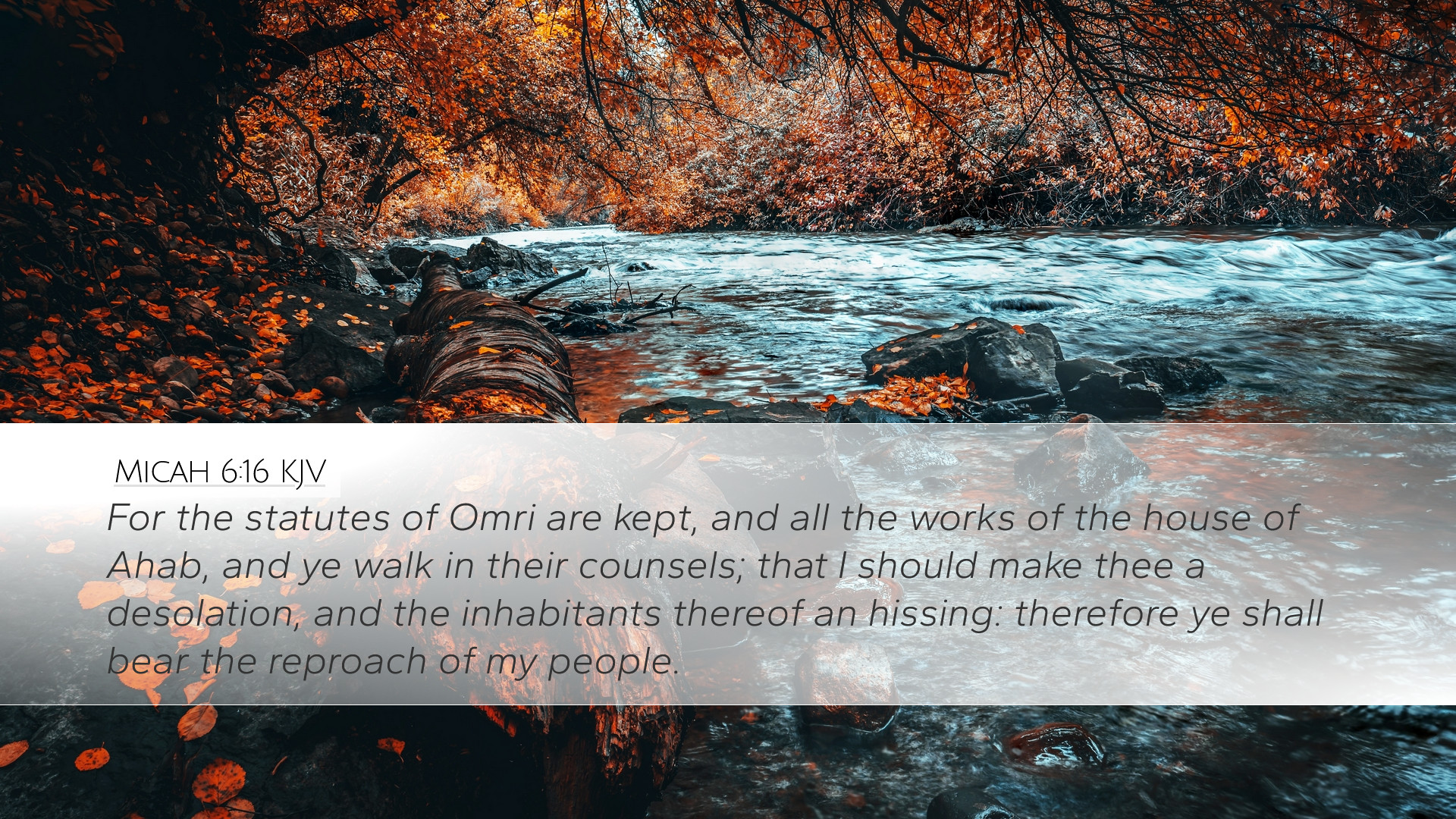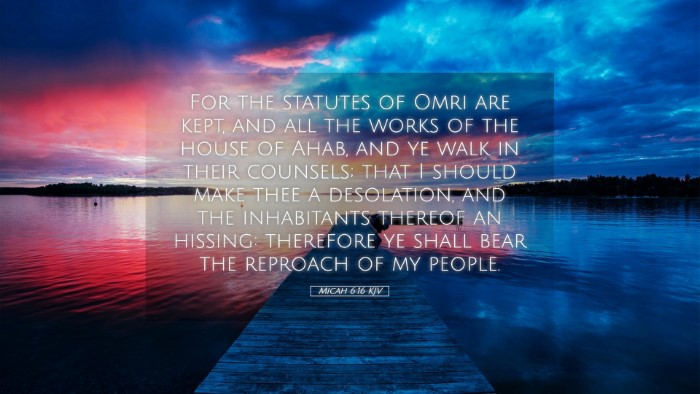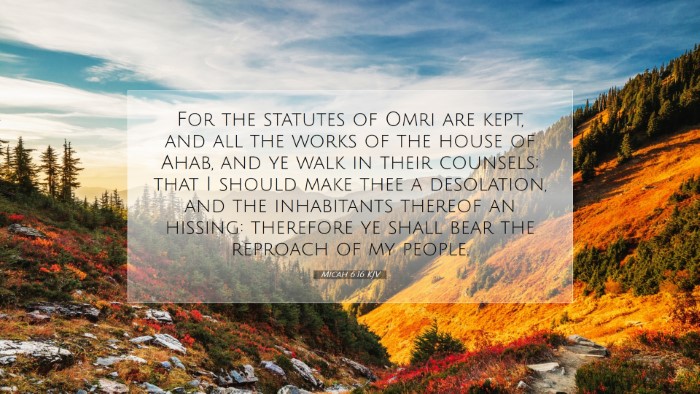Old Testament
Genesis Exodus Leviticus Numbers Deuteronomy Joshua Judges Ruth 1 Samuel 2 Samuel 1 Kings 2 Kings 1 Chronicles 2 Chronicles Ezra Nehemiah Esther Job Psalms Proverbs Ecclesiastes Song of Solomon Isaiah Jeremiah Lamentations Ezekiel Daniel Hosea Joel Amos Obadiah Jonah Micah Nahum Habakkuk Zephaniah Haggai Zechariah MalachiMicah 6:16
Micah 6:16 KJV
For the statutes of Omri are kept, and all the works of the house of Ahab, and ye walk in their counsels; that I should make thee a desolation, and the inhabitants thereof an hissing: therefore ye shall bear the reproach of my people.
Micah 6:16 Bible Commentary
Commentary on Micah 6:16
Verse: "For the statutes of Omri are kept, and all the works of the house of Ahab, and ye walk in their counsels; that I should make thee a desolation, and the inhabitants thereof a hissing: therefore ye shall bear the reproach of my people."
Introduction
The book of Micah holds a significant place in the prophetic literature of Scripture, serving as a divine commentary on the moral and spiritual failings of Israel and Judah. In Micah 6:16, we find a stark indictment against the people for their adherence to corrupt practices that lead them away from God's covenant. This commentary explores the theological implications of this verse, emphasizing its relevance for contemporary faith communities and individuals.
Contextual Background
Micah prophesied during a time of significant social injustice, idolatry, and moral decay in both Israel and Judah. The reference to “the statutes of Omri” and “the works of the house of Ahab” highlights the historical context of the Northern Kingdom, where these kings led Israel into idolatry and sin. This groundwork is essential for understanding the weight of Micah’s declaration.
Historical Significance
Omri and Ahab were pivotal figures known for their wickedness and for leading Israel into the worship of Baal, fundamentally turning the nation away from Yahweh. Micah’s condemnation centers on the fact that the people of Judah are following in these corrupt paths, reflecting a departure from true worship and covenant fidelity.
Theological Themes
- Divine Judgment: The mention of desolation serves as a prophetic warning of impending judgment. Micah communicates that the collective sins of the people will not go unnoticed by the Lord. As Matthew Henry points out, their disobedience will lead to their downfall and disgrace before other nations.
- Idolatry and Its Consequences: The reference to Omri and Ahab symbolizes the integration of pagan practices within Hebrew worship. Adam Clarke notes that such syncretism—the mixing of true worship with false practices—invites divine retribution.
- Community Accountability: Micah calls the nation as a whole to accountability. Albert Barnes emphasizes that the sins of leaders and influential figures can corrupt an entire community, leading everyone astray, illustrating the communal nature of sin and righteousness.
Lessons for Today
This verse serves as a poignant reminder for modern-day believers regarding the dangers of following cultural norms and practices that contradict the teachings of Scripture. As clergy, theologians, and laypeople, it is imperative to remain steadfast in the truth of God’s word and to avoid the snares of contemporary idolatry, which may not always be physical but can manifest in societal values and ideologies.
Personal Reflection
In reflecting on Micah 6:16, individuals are encouraged to examine their own lives for signs of compromise with worldly systems that lead them away from God’s standards. Each believer is challenged to consider how their choices align with God’s teachings and to seek restoration where necessary.
Applying Micah 6:16 in Ministry
For pastors and church leaders, this passage can serve as a basis for preaching against complacency within congregations. Urging members to uphold biblical principles and reject secular influences is vital to fostering a community that honors God above all else.
Preaching Considerations
- Call to Repentance: Emphasize the importance of repentance in response to God’s call, encouraging congregants to turn from cultural associations that dilute their faith.
- Teaching on Idolatry: Provide clear teaching on what constitutes idolatry today, including consumerism, nationalism, and other ideologies that compete with devotion to God.
- Promoting Righteousness: Lead initiatives that promote social justice and righteousness, modeling a community that reflects the character of God amidst a corrupt society.
Conclusion
Micah 6:16 serves as a sobering reminder of the consequences of deviating from God’s righteous ways. It challenges both individuals and communities to diligently pursue faithfulness and reject the cultural tides that threaten to sweep them away from their covenantal obligations. As believers seek to embody the truth of this passage, they become agents of change and restoration in a world rife with moral ambiguity.


